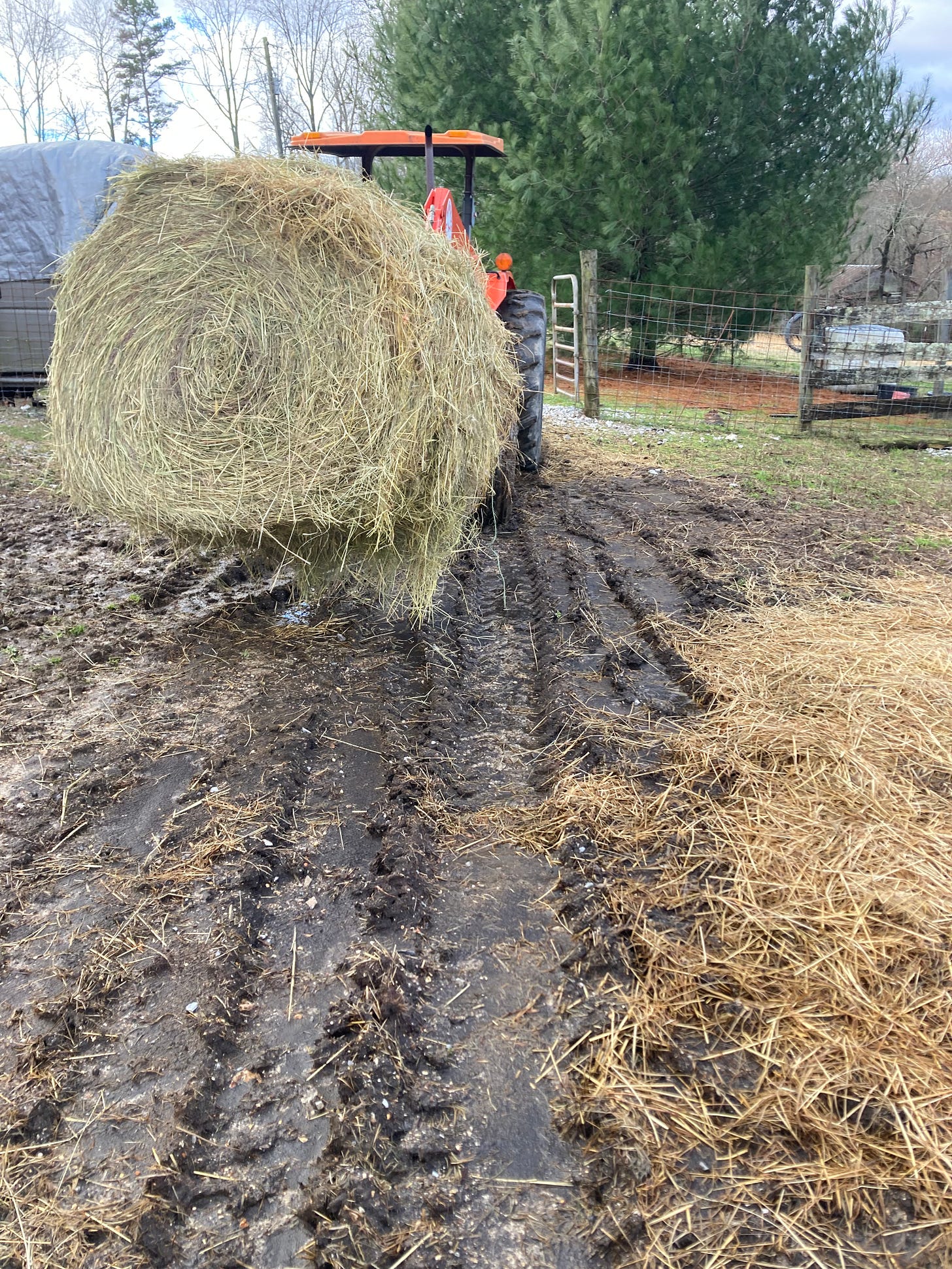Mud
The curious thing about mud is that it is only dirt pending the addition of water. Mud is all around us, waiting patiently to show itself for much of the year. It is to be found beneath the grass under your feet as you walk through the rounds of chores during the day. It is in the dry corrals of compacted clay and mixed in with the desiccated fecal matter from cattle and sheep. In the hog paddocks and woodland enclosures all tidy and dry, mud lies unnoticed, unborn, and unappreciated, until ... you add a freeze or three and water, lots of water.
Farm mud in true, full glory is a seasonal creature. You may catch glimpses of it during the spring, summer, and fall, but it doesn’t really come to life—a thriving, mischievous entity—until the arrival of winter. With mud’s appearance I am reminded of the lines from Hemingway about bankruptcy: “’How did you go bankrupt?’ ‘Two ways. Gradually and then suddenly.’” It rains, freezes, snows, melts, and repeats for a few weeks, and the grass still seems firm under the boot, albeit just a bit squishy. Then, one day the pasture releases its grasp on the earth, and each footstep taken thereafter may possibly be your last in the vertical. Mud returns. Gradually and then suddenly.
Mud can provide at these times a species of spiritual instruction if one knows how to properly decipher the language. I personally have found it useful in helping me understand the slim lease on mortality. On those days when a sense of my imminent demise causes me sadness at what has not yet been accomplished, the slurry that waits below acts as a catalyst to greater understanding.
To illustrate: Many years ago I was on my tractor, an old blue Ford 4000 without power steering. On the front hay spear was a 4x5 round bale; another was on the back spear. I left the barn, thus weighted, and drove down a moderately sloping hill on the way to feed the cattle in a lower field. As I approached the bottom pasture, I began to apply the brakes in preparation for navigating a narrow gate. At first I applied modest pressure. Nothing. I then tromped on the brakes with greater, desperate force. Nothing. Mud had intervened on the normal laws of frictional relationships, and tires and earth filed for temporary separation.
Below, in the field, my brother-in-law was holding the gate open wide. As I slid this way and that on the downhill, his eyes opened equally wide. At some juncture, as I contemplated what was left undone in this world, I took my foot off the brake, hoping to coast through to safety. Unfortunately, Old Blue had the nasty habit of popping out of gear without warning. This was one of those moments. With foot off the brake, I found the tractor gathering increasing speed in neutral, both it and the driver in full freefall mode.
That I am here relating this story means that all ended well enough, albeit with deep ruts down the field marking my path. (I managed to make it through the gate intact and rolled to a stop once the ground leveled. I traded Old Blue for a newer model with a reliable transmission the next week.) My misadventure did leave me with a healthy respect for the power of mud to bring deeper understanding regarding the meaning of life. It’s a power that should not be underestimated or go unacknowledged. Like life, mud is both temporary and eternal. The ruts from the tractor tires, the sludge throughout the barnyard—they may seem permanent on the farm in February. Yet, as May arrives, by the mutual efforts of time and warm spring weather, ruts now covered over by grass, mud shape-shifts and is once again hidden from view. By June it is a fading memory from the childhood of the year, soon to be forgotten. But it is waiting.
Like most things on a farm, the slurry, the muck, that frictionless engagement with the physical earth, these are cyclical experiences of the past, present, and future. Mud reminds us to slow down, tread carefully, drive only when needed, pull the livestock off the quiescent fields, and keep an ample supply of gravel. Mud is nature’s reminder of our limits, the seasonality of our work on the land, and the promise of renewal after the dormancy. All that is required to unleash its power is to add water.
………………………………………………………………………………………….
Reading this week: Philandering Angler (A. Applin), an inter-war years memoir of life and fly fishing.


Beautiful story, can 100% relate. But just think of how much time you saved by carrying two bales instead of just one!
Mud season is the only time I can get post holes dug in our Arkansas red clay without calling in a professional drilling rig. The trade-off is being covered in a fine layer of ochre for a couple weeks after, and finding it in unexpected places that never got anywhere near the ground.